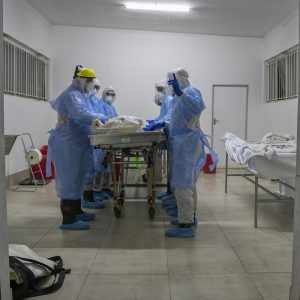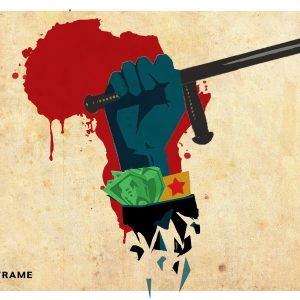Covid-19 Roundup | Level two
President Cyril Ramaphosa’s downgrading of Covid-19 restrictions comes as predictions indicate South Africa is moving past the peak of the pandemic. But job losses and state corruption continue.
Author:
21 August 2020

Mortality figures
It will take some time before we fully understand how many lives have been lost to the coronavirus.
South African Medical Research Council figures from this week show that there were 36 587 excess deaths in South Africa between 6 May and 11 August. The rate of excess deaths has started to fall as official Covid-19 deaths have fallen, which indicates that most of these deaths can be attributed to the virus.
Related article:
Another important measure of mortality is the p-score. A p-score of 0% means the mortality rate is in line with what was expected. A p-score of 100% shows a mortality rate of twice that which was expected. The p-score in all provinces is decreasing. They peaked between 15 and 22 July, when mortality rates in Gauteng, the Eastern Cape and the Free State were more than double what was expected.
Recovery rate
As South Africa edges towards 600 000 infections, Minister of Health Zweli Mkhize says the country is moving away from the peak of the pandemic. The increased recovery rate is a positive turn, he says.
Speaking at the release of the United Nations Development Programme’s Socio-Economic Impact Assessment of Covid-19 on South Africa, Mkhize said: “Whereas the numbers are approaching 600 000 cases, we do know that there will be more people than that who are positive in the country.”
South Africa has surpassed 12 000 coronavirus deaths and Mkhize said this lower rate should engender a positive outlook. “It is the right time for us to start considering the steps that must be done as we move through the risk-adjusted approach towards normality.”
Covid-19 in Africa
The latest World Health Organization (WHO) report on Africa shows that the spread of Covid-19 on the continent continued to slow in the first two weeks of August.
The report says that since releasing its situation report 23 on 5 August, “75 326 new confirmed Covid-19 cases (9% increase) was reported from 44 countries between 5 and 11 August 2020, compared to a 13% increase recorded during the previous reporting period (29 July to 5 August 2020).”
It noted that South Africa, which has reported the majority of new cases, recorded a “remarkable downward trajectory in trend … There were also reductions in incidence cases in Nigeria, Ghana and Algeria in the past week. While these indicators are encouraging, the figures should be cautiously interpreted as they may be affected by many factors, including the current testing capacity and strategy.”
Related article:
The Gambia continues to register the highest increase in cases, with 85% from 5 to 11 August, followed by Botswana at 33%, Namibia with 31% and Angola at 29%. Other countries with high percentage increases include Zambia with 26%, Mozambique with 22% and Ethiopia with 22%.
The number of Covid-19 cases in Africa has exceeded a million, with more than 23 000 deaths and over 700 000 recoveries.
Temporary vs permanent jobs
Early Childhood Development (ECD) centres have protested against Minister of Social Development Lindiwe Zulu’s announcement that R1.3 billion of the Covid-19 economic stimulus package will be used to hire 36 000 youth compliance monitors for ECD programmes.
Activists Eric Atmore, Colleen Horswell-Daniels and Charmaine Botha led a coalition of ECD centres, saying it does not make sense to direct public funds towards new, temporary jobs when the sector has lost so much money in fees during the lockdown that about 175 000 jobs in 30 000 ECD centres will be lost permanently.
Related article:
“R1.3 billion has the potential to sustain over 175 000 long-term jobs, mostly pioneered by women entrepreneurs at the community level,” they said. The activists called for the funds to be allocated directly to early childhood centres as “ECD continuity grants”. Zulu had not responded to their suggestion at the time of publication.
Controversial appointment
Zandile Gumede, the controversial former mayor of Durban who was fired in August 2019 after being arrested for corruption in connection with a multimillion-rand waste disposal tender, has been sworn in as a member of the KwaZulu-Natal legislature.
She replaces former ANC member of the provincial legislature Ricardo Mthembu, who died from Covid-19 in July.
Gumede is currently out on bail of R50 000 over the Durban Solid Waste tender scandal. She and her co-accused allegedly conspired to award tenders to a number of service providers who failed to deliver the service and had no capacity to do so.
Related article:
Shack dwellers’ movement Abahlali baseMjondolo has condemned the move: “The ANC is a deeply corrupt and violent organisation. They steal from us with impunity.
“Gumede ran the eThekwini Municipality into the ground. She is currently facing charges for tender fraud of close to R400 million. We all know that this is just a small fraction of the actual fraud that has been committed. The entire tendering system is corrupt,” it said.
Limpopo corruption allegations
Despite allegations of rushed spending, corruption and malfeasance, Limpopo Department of Health head Thokozani Mhlongo has downplayed concerns.
The province’s health portfolio committee has received complaints about alleged corruption and malfeasance in relation to Covid-19 procurement and spending, with the department’s spending galloping from R250 million to more than R500 million in just two months.
Provincial Health Committee chair Joshua Matlou expressed deep concern about the spending, saying that procurement “was used as a free ticket by unscrupulous elements who saw this as an opportunity for wanton spending of the public purse”.
Related article:
Limpopo member of the executive council for health Phophi Ramathuba denied instructing her officials to appoint and award specific personal protective equipment (PPE) service providers with political links to her. She said the awarding of contracts and supply chain processes was governed by the Public Finance Management Act (PFMA).
“I had no role in the awarding of any contract. The PFMA empowers the HOD and not the MEC. No, I did not instruct the department to appoint any hand-picked company to supply PPEs,” she said. This was after allegations surfaced of her alleged misconduct with regards to PPE-related dealings.
In the earlier stages of the government’s lockdown, the provincial department awarded a KwaZulu-Natal company a R185 million contract to supply Covid-19 PPE, including sanitiser, despite it not appearing on the official database of suppliers. Since then, the premier has been asked to investigate this and place Ramathuba on special leave.
But on 17 August, Mhlongo claimed that due process had been followed. She said local companies could not meet their demand and that the province had not run out of sanitiser, adding that the department saved more than R300 million in their procurement of PPE.
The province recorded its first Covid-19-related deaths of health workers on 14 August.
Durban beaches reopen
The relaxation of Covid-19 lockdown regulations to level two means that South Africa can now slowly start to enjoy the little pleasures in life again, such as taking a stroll on the beach. The eThekwini Municipality has officially reopened its beaches, nature reserves, public parks and open spaces.
“These [level two] regulations allow that residents utilise these recreational amenities for activities such jogging on the sand, walking, running, yoga and other healthy lifestyle exercises, while the municipality is taking the necessary steps to ensure regulations for swimming are in place,” said the City on 18 August.
The municipality said it would be monitoring the situation closely to ensure that people adhere to physical distancing and restrictions with regards to the number of people on the beach at any given time. “Protocols are still being finalised for the reopening of the beaches to the public … The public is hereby requested to please note that the country is still on lockdown and as a result, group activities and events that attract a large number of spectators are not permitted.”
Farm dwellers back in court
Farm dwellers and the Association for Rural Advancement (Afra) have had their day in court to request that a court order be implemented despite a pending appeal.
In 2019, the Pietermaritzburg high court ruled in favour of farm dwellers, saying local and district municipalities must provide basic services such as water, sanitation and refuse collection on farms. The Msunduzi Municipality then filed an application for leave to appeal the order at the Supreme Court of Appeal. But this is yet to be heard, and farm dwellers claim to have suffered prejudice without access to these basic services and the high court order being suspended because of the pending appeal process.
Related article:
Represented by the Legal Resources Centre, the farm dwellers are relying on Section 18(3) of the Superior Courts Act, which allows for a court order to be implemented pending the appeal process. They say their dignity will be restored if the court forces the municipalities to implement the initial order.
The court has ruled that the municipalities must comply with the order regardless of an appeal. Municipalities will have to file their implementation plan with the court, along with monthly progress reports, to ensure that farm dwellers have access particularly to water during the Covid-19 pandemic.






